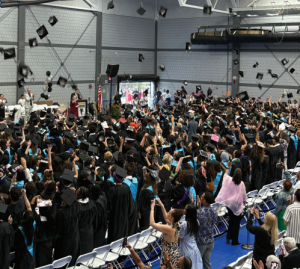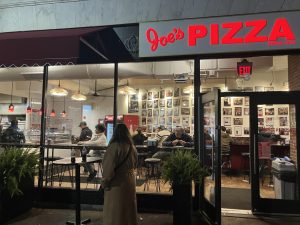Reflecting on the March for Our Lives
April 25, 2018
On March 24th, 2018, I stood among an estimated 800,000 people in Washington, D.C., for the March for Our Lives. The march was accompanied by around 800 sister marches across the country. It was organized by the survivors of the Marjory Stoneman Douglas High School shooting to push for stricter gun control measures such as a ban on assault weapons and universal background checks, and to protest against arming public school teachers. Student activists and survivors Emma González, Aalayah Eastmond, David Hogg, and Samantha Fuentes were among the 17 to speak at the rally. Fuentes delivered powerful words during her speech: “The moment we speak up, we’re scolded that we are not old enough,” she stated. “It’s as if we need permission to ask our friends not to die.” She ended her speech by singing “Happy Birthday”—a tribute to Nicholas Dworet, a student killed at Stoneman Douglas, who would have turned 18 that day.
González was one of the many speakers who followed Fuentes’s words. “Six minutes and 20 seconds with an AR-15 and my friend Carmen would never complain to me about piano practice,” she began as she acknowledged—one by one—each of the 17 victims killed on the 14th of February.
These words were followed by a six minute and 20 second long silence—exactly how long it took for the shooter, Nikolas Cruz, to kill 17 and wound fifteen others. I watched a wave of fists rise in the air, offering love and support for González and all survivors of gun violence.
Eleven-year-old Naomi Wadler, who led a walkout at her elementary school, spoke at the rally on behalf of African American girls who are victims of gun violence and whose stories do not make the front page. Nine-year-old Yolanda Renee King continued, following the footsteps of her grandfather, Martin Luther King, Jr. “I have a dream that enough is enough,” she declared. “That this should be a gun-free world, period.” This message was one of the many viewpoints that were displayed at the march. King wishes for guns to not be used under any circumstances, but the Parkland survivors are pushing for gun control—as opposed to the banning of all guns. This momentous march is not the climax of the movement, it is just the beginning. Many, including myself, believe that enforcing stricter gun control is a step in the right direction. From the hundreds of March for Our Lives marches across the country, it is clear that by supporting victims of gun violence and empowering one another, the youth of America is proving that change is possible.
This piece also appears in our March/April print edition.









